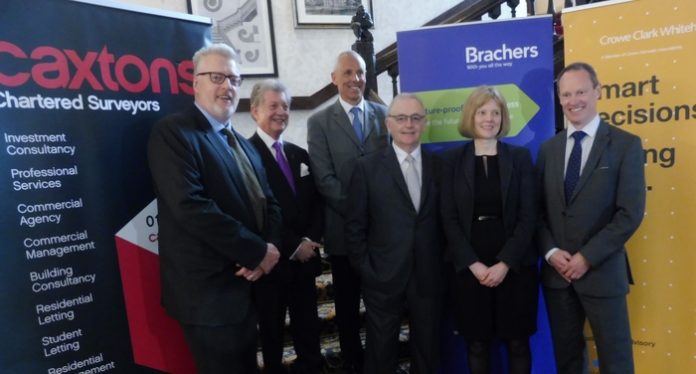
Property specialists Caxtons Chartered Surveyors, audit, tax and advisory firm Crowe Clark Whitehill and Brachers law firm recently held a joint Property Outlook lunch for invited movers and shakers across Kent and the South East.
Developers, house builders, bankers, construction companies and other property people came together at Eastwell Manor to hear speakers Peter Bill, and Mark Kibblewhite share their thoughts and intelligence on the sector.
Peter Bill, the respected author and property journalist for the Evening Standard, Property Week, Estates Gazette and Building Magazine spoke first.
Giving a sometimes-controversial speech Peter included a macro view of the property sector, the impact of Brexit, and focused on the outlook for Kent.
He spoke of a shifting attitude towards office occupation noting a gravitation towards serviced offices – strongly affected by a new wave of IT – and predicted that it might not be long before 30% of all offices are serviced space.
On the industrial sector he bemoaned the lack of warehouses –particularly in Kent, and believes an emerging joined-up push on re-invigorating high streets was evident in the retail sector, with permitted development rights aiding change of use and residential playing a bigger role.
He asked why house builders did not build more quickly but got short shrift from one quality house builder who said firms the size of his build to supply market demand rather than to leave properties empty for months on end. He said house builders were not there to solve the housing crisis.
Peter said, the government’s property ambitions to secure long-term sustainable development for commercial and residential sectors had ensured considerable government help for Kent with little return on investment. He flagged a step change in policy due in May, with further planned Civil Service de-centralisation and 200 mini-hubs being created across the country that would present opportunities.
He said the Kent Property Market Report was ‘filled with gems’, and that the county was doing OK with lots of activity across the entire property sector.
The second speaker, Mark Kibblewhite, is a non-executive director at Invest and Fund, a peer-to-peer platform helping individuals, high net worth lenders, institutions and others achieve risk-adjusted returns from residential development projects.
Mark spoke about why the clearing banks had moved away from financing smaller property loans, for reasons of capital values, perceived and actual delivery problems/delays, lack of expertise and past ‘over exposure’ to property and said that in their place, the challenger banks, credit funds, institutional lenders, listed funds and peer-to-peer lenders were now occupying the territory.
He touched on what interested and convinced the new lender categories to facilitate particular projects and looked at what might be a financeable project and why – notwithstanding planning risks/gains.
Mark was clear that collectively, the availability of capital, particularly for house building but also other property, is vast. If a firm seeking funding is experienced, then there is a wide range of alternatives – especially with an attractive proposal on the table. Preparation is key, as is finding the right funding match.
Discussion ensued and on whether Kent would be better served by large or small scale development delivery, one house builder said smaller developers build between 20 and 30 quality properties per site and can contribute a lot to the landscape. He agreed government had done a great deal. Help to Buy had been a success for them, assisted people to get on the housing ladder and stimulated the market.
There was agreement that delays in the building industry could often be attributed to the knock on effect of problems such as timely installation of broadband, water and energy to new developments, and the insufficient number and calibre of Local Authority planners.
Locate in Kent’s Chris Broom said that there was ample demand but a distinct lack of commercial development across Kent, especially large warehouses in north Kent. He noted some new build under way, including some by district councils who want to fill a gap locally, and that business rate retention by councils had helped with the latter.
In conclusion, the audience was positive and vocal about Kent’s property market – especially house builders who confirmed residential property sales have increased. But there is a distinct lack of commercial stock.
Auctioneer Clive Emson said 85% of all lots presented for sale are sold and there are plenty of potential buyers around, but he wants more property to sell.
Neil Chatterton, MD at Caxtons who specialises in commercial property, in particular management, professional and investment work, said he was encouraged others agreed Kent was well positioned to take advantage of a mostly positive outlook for the sector.
“The speakers gave our guests intelligence and opinion that will have left many feeling better equipped to make decisions in relation to property – whether disposal, acquisition, expansion or contraction. Hopefully, the forum will have given them the chance to renew acquaintances with those they have worked with successfully in the past and to meet people they feel they could do business with in future.
“It’s an exciting time and place to be involved in property and at Caxtons, we hope to make the best of all the opportunities presented. Including Brexit.”
Ash Jilani, Partner at Brachers, said: “It was fantastic to have so many experts in the property sector come together to discuss the outlook for real estate in Kent and the South East and to share their valuable insight and experience. The uncertain economic and political climate no doubt poses challenges but there was real optimism in the room about the future of the sector and the opportunities for sustainable and long-term developments in the county and beyond.”
Summing up the day, Simon Crookston, partner at Crowe Clark Whitehill said: “It was good to hear the views from a broad spectrum of organisations with an active interest in the property sector. The theme from the debate for Kent property businesses was that those in the property sector generally seem positive. Funding seems to be available for established investors and developers with a good track record; property development seems to be performing well and there are investment opportunities around. Overall, it is good to hear that people feel upbeat despite challenges which are affecting the sector.”





















